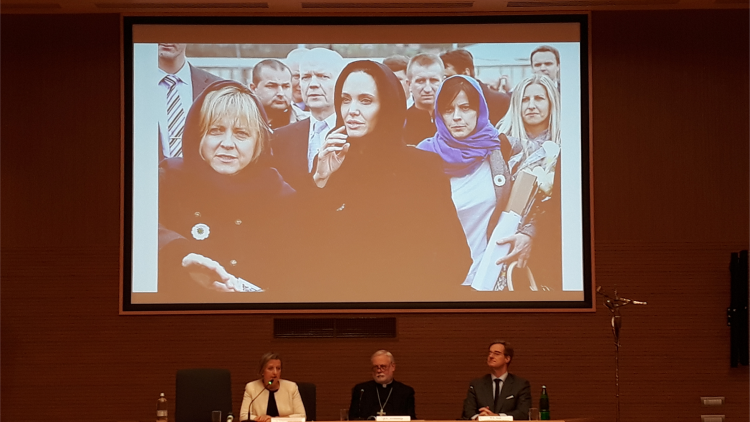
Britain, men and women religious, together champion the same cause
By Sr Bernadette Mary Reis, fsp
The British government has been actively combating sexual violence against women in conflict zones since 2012. A Film Festival held in London last week, and a panel discussion in Rome, are two recent events held to raise awareness.
Sr Bernadette Reis spoke with Sally Axworthy, the British Ambassador to the Holy See. She discusses three concrete areas that Britain is working on to end sexual violence in conflict. Collaborating with the Catholic Church through the network of religious men and women is an essential part of their strategy.
Initiative is born
The British government’s initiative targeting sexual violence toward women in conflict began in 2012. Ambassador Axworthy said, “it was born out of concern about what had happened in Bosnia where the UN estimates around 60,000 women were raped”. It was kicked off with a global conference in 2014 at which Angelina Jolie and former Foreign Secretary William Hague spoke.
Legal reform
Three strategies were identified and have since been developed and implemented. “The first is trying to get justice and support for survivors”, Axworthy explained. These efforts include making sure this crime against women is recognized through legal reform and that perpetrators are brought to justice. Several cases have been successfully prosecuted in both Bosnia and the Congo, she said.
Stigma
Tackling stigma is the second goal. “When people are victims of sexual violence, they don’t just suffer on the day” the Ambassador continued. Many victims are ostracized by their families and communities. In addition, she said, “they might be blamed for what’s happened. They might have children as a result of the sexual violence.” With the help of experts, the British government has created a document and funds projects in the hopes of changing this component of the tragedy suffered by so many women.
Prevention
The Ambassador said that prevention is perhaps the most difficult of the three strategies. British troops serving overseas, and military and police in other countries around the world have received training in this area. Many of them belong to forces serving as peace keepers in conflict zones. These forces have been sensitized to the issue and taught how to respond to it.
Empowering women
When asked why Britain has embraced this issue, the Ambassador explained that Britain “is very keen to champion moral issues like this one…. It is an abuse of human rights, specifically the human rights of women. Our foreign policy is very focused on promoting and empowering women and girls. That’s why we’re interested and we’re really trying to do our best to change the situation with sexual violence being used as a weapon of war.” Britain recognizes that it is a global problem requiring a global solution. Axworthy said that the British government is working with “many, many other countries”, primarily those experiencing conflict.
Pastoral support of victims
The Ambassador concluded saying that the British government also considers the Catholic Church as a partner in this campaign. She said that religious orders have collaborated with them. They provide the “pastoral support of victims. That’s obviously something we can’t do, but we recognize their contribution.” The British government trains these religious especially regarding the “accountability mechanisms”: prosecuting perpetrators, preserving evidence, and forming cases. “We’re a good fit”, the Ambassador said. “We do different things, but together we can be more effective.”
Thank you for reading our article. You can keep up-to-date by subscribing to our daily newsletter. Just click here







